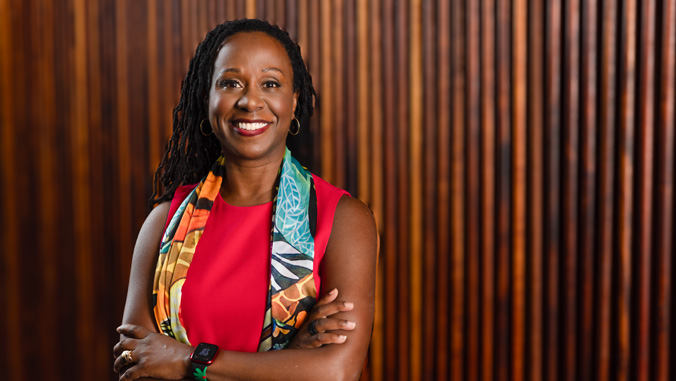
For her contributions in advancing leadership, professional responsibility, pro-bono service and gender equality in law, University of Hawaiʻi at Mānoa William S. Richardson School of Law Dean Camille A. Nelson was selected as a recipient of the 2025 Deborah L. Rhode Award presented by the American Association of Law Schools (AALS). Nelson will receive the award at the AALS annual meeting in San Francisco, California on January 9.
The award is a joint recognition by AALS sections on leadership, pro bono and service opportunities, professional responsibility and women in legal education. It honors the contributions, service and leadership of Rhode by recognizing a current trailblazer in legal education and the legal profession.
“I am truly humbled by this recognition,” Nelson said. “It means so much to me—more than I can adequately convey. It is incredible and fills me with joy and appreciation to have my name uttered in the same breath as the legendary Deborah Rhode. I consider myself blessed to be included among the other recipients of this prestigious Award. You made my year—thank you!”
Nelson will share the honor with Jessica Steinberg, John Marshall Harlan Dean’s Research Professor of Law at George Washington University Law School.
“All of this year’s nominees for the Deborah L. Rhode Award were incredibly inspiring,” said Janine Dunlap-Kiah and Deborah Schlosberg, co-chairs of the award selection committee. “The committee is thrilled to recognize Dean Nelson and Professor Steinberg for their impactful work. They both are shining examples of Professor Rhode’s commitment to access to justice and gender law and policy. We are confident that they will continue to blaze the trail for their colleagues in the legal academy and leave a lasting legacy just as Professor Rhode did.”
In addition to Nelson’s leadership impact and teaching excellence, her research and writing are far-reaching in their focus. Her appreciation of legal scholarship in its historical, international and interdisciplinary contexts has implications for areas as vast as criminal law defenses, policing, cultural studies in legal theory and musicology, mental health implications for tort law, as well as critiques of historical applications of property law during American and West Indian slavery.
Nelson’s research has recently also highlighted topics in higher education, such as explorations of technological transformation, diversity, inclusion and equity, and organizational behavior in the legal academy.

